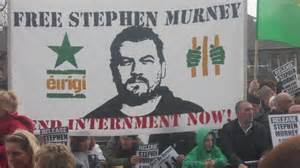http://www.scotsrepublic.com/2013/09/human-rights-are-under-threat-in-north.html
New York based Sandy Boyer is the co-host of “Radio Free Eireann” broadcast Saturdays at 1pm on WBAI, 99.5 FM, or wbai.org. He has helped to mobilize support for political prisoners including Marian Price, Roisin McAliskey, the Birmingham 6, Pol Brennan and Joe Doherty. Here he outlines the continued threat to human rights in Northern Ireland.
Fifteen years ago, the Good Friday Agreement promised a Bill of Rights for Northern Ireland. Today there is still no Bill of Rights, and human rights are under a severe and sustained attack.
Internment without charge or trial is back; “special” political offenses are being used to muzzle political activists; and the police have intimidated witnesses.
Internment was formally ended in 1975. But now it is being used against former political prisoners who are imprisoned indefinitely because their “license” (parole in American terms) has been revoked. They are never told why it was revoked and not even their lawyers can see what evidence, if any, is being used to keep them in prison.

Martin Corey has spent more than three years in Northern Ireland’s Maghaberry Prison. He is imprisoned indefinitely without a charge, trial, sentence or release date because the Secretary of State for Northern Ireland, a British Cabinet Minister, has revoked his license. There is very little chance of that he will be released any time in the foreseeable future.
Martin Corey received a life sentence in December 1973 when he was 19 years old for killing two members of the Royal Ulster Constabulary, the Northern Ireland police force, in an IRA operation. He served 19 years and was released in June, 1992.
In the early hours of April 16, 2010, almost 18 years after his release, the police took Martin Corey away to prison. He was informed that the Secretary of State for Northern Ireland had revoked his license because he was a “security risk.”
Last year a Belfast judge ordered him released on unconditional bail because he was being held on the basis of secret evidence. His family rushed to the prison to bring him home.
But while Martin Corey was sitting in the prison reception area and they were waiting outside, the Secretary of State for Northern Ireland overruled the judge and ordered him re-arrested.
His lawyers have announced that they will appeal to the European Court of Human Rights. But it could be years before any appeal is even heard, let alone decided.

Marian Price was held in solitary confinement for more than two years after the Secretary of State for Northern Ireland announced that he had revoked her license. Neither she nor her lawyers were allowed to see the evidence against her. Twice judges ordered her freed on bail. Twice the British Secretary of State for Northern Ireland overruled the judge and ordered her back to prison.
Marian Price is one of the best known former IRA prisoners. After she was convicted of bombing London’s Old Bailey Courthouse in 1973, she embarked on a hunger strike that lasted over 200 days, demanding to serve her sentence in Northern Ireland. She was force fed over 400 times and her heath never recovered
After Marian Price was returned to prison in 2011 her health deteriorated so badly that she had to be moved to a hospital. Even after she was in a wheelchair, there was a prison guard stationed outside her door 24 hours a day. She was handcuffed for family visits and even during medical tests.
When the Parole Commission finally released Marian Price she was suffering from pneumonia, arthritis so severe that she couldn’t open her hands and the anorexia she developed during her hunger strike had returned.
Stephen Murney is in Maghaberry Prison charged with “collecting information likely to be to the use of terrorists” and “distributing information likely to be of use to terrorists” because he took photographs of members of the Police Service of Northern Ireland at political demonstrations.
He published some of these photographs in local newspapers and posted others on facebook. He also saved images of protests in Northern Ireland over the last 45 years on his computer.

Stephen Murney was arrested on December 1, 2012 and remanded to Maghaberry pending a trial. He is still there today and no trial date has ever been set.
He was offered bail but only on condition that he not live at home with his partner and their child, never enter his home town even to visit a doctor or his family, never attend a political meeting or event and wear an electronic monitoring device . He rejected these conditions.
Stephen Murney is a well known political activist in the Newry area of Northern Ireland. He is a prominent member of Erigi, a legal political party throughout Ireland.
Significantly, although Erigi rejects the Good Friday Agreement it does not believe that an armed struggle can be effective in today’s Ireland. Erigi General Secretary Breandán Mac Cionnaith,, says it is “not aligned to, or supportive of, any armed organisation.”
Stephen Murney’s prosecution is a threat to political activists and photo journalists. Legal and human rights organizations often advise activists to take pictures of any police misconduct. This can be the only way to prove that the police have actually been violent or abusive. Photojournalists may hesitate to photograph the police in action if they know they could be charged with “collecting material of use to terrorists.”
The Police Service of Northern Ireland tried to intimidate a witness who could have discredited the murder convictions of Brendan McConville and John Paul Wooten. They are serving 25 years (McConville) and 14 years (Wooten) for killing Police Constable Stephen Carroll.
Their conviction rested on the testimony of a man known only as “Witness M” who said he saw the two men leaving the scene of the crime. The defence team located a close relative of “Witness M” who swore in an affidavit that “he was known in the family as a Walter Mitty that he made up stories, that he had a fertile imagination and you could not believe anything he said.” According to this relative, Witness M could not have taken the route he claimed on the night of the killing because his partner was not welcome in his home.
After this affidavit was submitted to the Court of Appeals the police forced their way into this man’s home and threatened to discredit him if he testified at the appeal hearing. Shortly afterwards he was arrested, held for three days, and questioned about his possible testimony.
Defense lawyers have stated that the PSNI put not only this new witness but the defence team itself under surveillance. Brendan McConville’s solicitor, Darragh Mackin says that both he Peter Corrigan, John Paul Wooten’s solicitor, were afraid that they would be arrested before the appeal hearing. “It’s an absolutely terrifying fact to think that one or both of us could be arrested.”
The case has been adjourned until October. Even if McConnville and Wooten are freed then, they will have spent four and a half years in Maghaberry Prison.
Martin Corey, Marian Price, Stephen Murney, Brendan McConville, and John Paul Wooten are all “dissident republicans” who are actively opposed to the Good Friday Agreement. Some people are reluctant to publicly support them for fear of being tarred with the same brush. Gerry Conlon of the Guildford 4, who was imprisoned for 16 years for a bombing he didn’t commit, said that “people who we know should be speaking out are not speaking out.”
But if these “dissident republicans “are imprisoned, everyone’s human rights will be in jeopardy. Anti-drugs campaigners, community activists or even militant trade unionists could be next. As Irish civil rights leader Bernadette Devlin McAliskey has said this is “a clear signal that no dissent will be tolerated. No dissent will be tolerated and you challenge the status quo at your peril.”
Originally published in The Irish Echo
also see
Twisting Facts To Suit British Law
Price Demonstration Shows Growing Anger At The Return Of Internment
